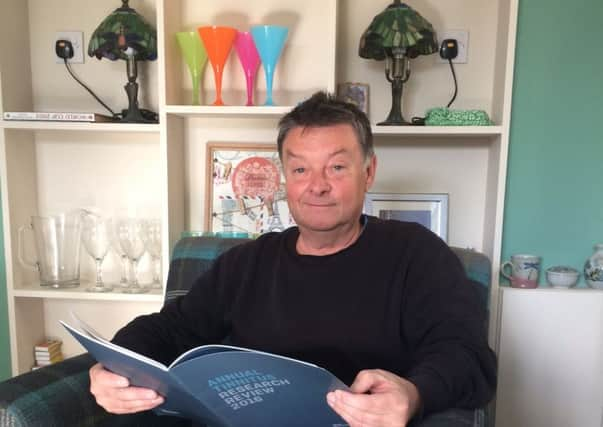Mystery injury lead to tinnitus torment for Ian


Ian Foster will probably never know how he ended up in hospital covered in blood with a fractured skull nearly ten years ago, but he is still living with the after-effects.
“My wife, Helen, had gone away to look after her mum’s dog for the night but when she returned she found me in bed covered in blood with really serious injuries,” says Ian 60. “She phoned an ambulance immediately and I was whisked off to hospital. I was put into the high dependency unit until the bleeding on my brain stopped but when I woke up again I had absolutely no memory of what had happened.
Advertisement
Hide AdAdvertisement
Hide Ad“We still do not have the answers which is difficult but we have deduced that I was either hit by a car or attacked and that somehow, in a very confused state, I managed to get home. But whatever happened left me with severe injuries including a fractured skull, broken ribs and a severed ear. “
Ian, who was a self-employed builder, was unable to go back to work for two years and he can still only work for about 40 days a year.
“The other, most distressing issue I have been left with, which started almost immediately after my injury, is 24/7 tinnitus,” says Ian from Sheffield. “I hear a high-pitched screech every minute of every day and the effect on my life is massive because it is just always there and it makes it particularly difficult for me to get to sleep which causes a lot of problems. At first I had no idea what the noise was which was very worrying and when I was told about tinnitus I had never even heard of it. But I was referred to hearing services and that was when I found out more and understood a bit more about the condition.”
Ian is one of six million with tinnitus who could be helped by research carried out in Leeds. Dr James Jackson, associate principle lecturer in psychology at Leeds Trinity University has led a pilot study, funded by the British Tinnitus Association, looking at the concentration of the stress hormone cortisol in tinnitus sufferers. His evidence suggests that people who report a high level of distress caused by their tinnitus also have a flat diurnal cortisol rhythm which could lead the way to developing more effective interventions.
Advertisement
Hide AdAdvertisement
Hide AdTinnitus is an often debilitating condition that is described as a sensation or awareness of sound that is not caused by a real external sound source. It affects one in ten UK adults and there are approximately 750,000 tinnitus related GP consultations in England each year. The condition can greatly impact on a sufferer’s quality of life with approximately half of patients finding it moderately or severely distressing with complaints of intrusiveness emotional stress, insomnia, auditory perceptual problems and concentration problems. As part of his study, Dr Jackson asked participants to provide saliva samples first thing in the morning so he could look at stress hormone levels.
Waking up is the time of day when you are secreting the highest concentrations of stress hormones, particularly one called cortisol, in anticipation of the day ahead and I wanted to investigate the mechanism which produces it.
“In general, you pump out cortisol first thing, and you reach peak secretion approximately 40 minutes after waking up. Levels then fall back all day, and should be down to nearly nothing at roughly midnight, when you fall asleep and have no energy. There is a set rhythm for this called the diurnal cortisol cycle. My research has been looking at the effect tinnitus has on this morning rhythm and I hypothesised that it would have more in common with conditions such as chronic pain. It’s been a small study but I can conclude that there is evidence suggesting a flat diurnal cortisol rhythm in distressed tinnitus sufferers. Right now, this appears to be related to ‘burnout’ where, due to issues these particular patients have such as a lack of control, an inability to relax and emotional distress caused by the tinnitus, their bodies have shut down cortisol production. “
In a bid to help find a cure for tinnitus, the BTA has spent over £575,000 in 2015 on research studies into the condition including funding Dr Jackson’s work.
Advertisement
Hide AdAdvertisement
Hide AdAs for Ian Foster he says he is helped by a sound machine and also by walking along busy roads, as his tinnitus is worse when it is quiet.
“Tinnitus is just not understood by the vast majority of people – you can’t see it so people just can’t identify with it at all so it is important you find those people who appreciate what you are going through.”